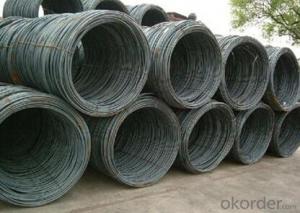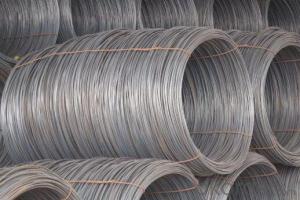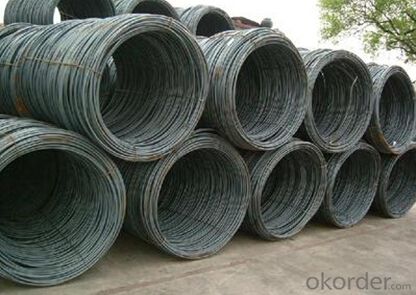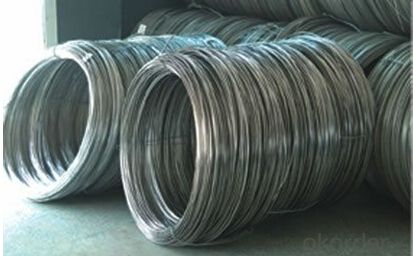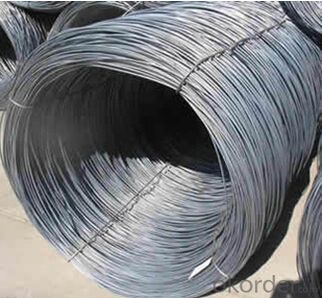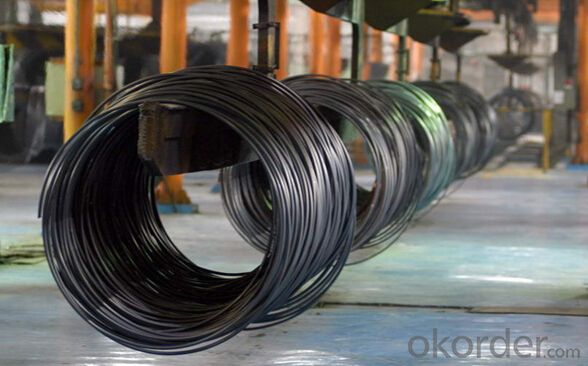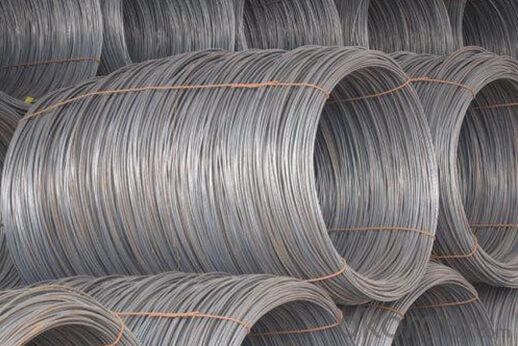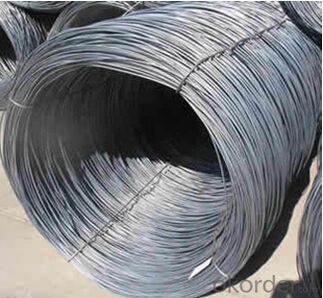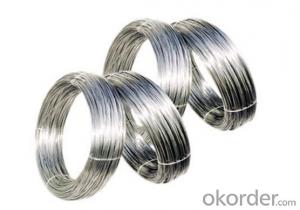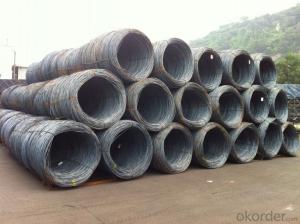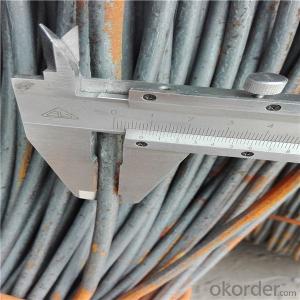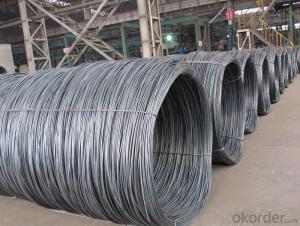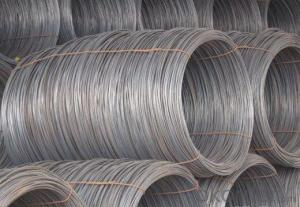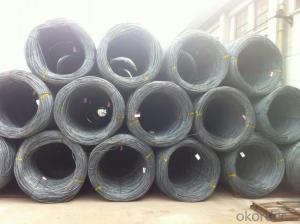Grade SAE 1008 Hot Rolled Steel Wire Rod in Coils
- Loading Port:
- Tianjin
- Payment Terms:
- TT OR LC
- Min Order Qty:
- 3 m.t.
- Supply Capability:
- 10000 m.t./month
OKorder Service Pledge
Quality Product, Order Online Tracking, Timely Delivery
OKorder Financial Service
Credit Rating, Credit Services, Credit Purchasing
You Might Also Like
Specification
Type:
Carbon Steel,Alloy Steel,Spring Steel,Bearing Steel,Gear Steel,Deformed Steel,Stainless Steel
Shape:
Steel Coil,Steel Sheet,Steel Wire Rod,Steel Flat Bar,Steel Square Bar,Steel Angle,Steel Round Bar,Steel Billets
Technique:
Spring,EFW,Extruded,Hot Rolled,Cold Rolled,Cold Drawn,ERW,Forged,Saw
Surface Treatment:
PVDF Coated,Black,Bright,Polished,Chromed Passivation,Dry,Oiled,Color Coated,Copper Coated,Coated,Galvanized
Certification:
UL,API,CE,RoHS,IBR,BV,SGS,ISO,BSI
Thickness:
5.5-12mm
Width:
5.5-12mm
Length:
In coils
Outer Diameter:
5.5-12mm
Net Weight:
2m.t.
Packaging:
Seaworthy packaging
Grade SAE 1008 Hot Rolled Steel Wire Rod in Coils
Detailed Information of the Grade SAE 1008 Hot Rolled Steel Wire Rod in Coils
| Name | Hot Rolled High Carbon Wire Rod |
| Shape | Round Bar/Square Bar/Flat Bar/Plate/Wire |
| Standard | GB/ASTM/SAE/AISI/DIN/JIS/EN/BS |
| Surface Treatment: | Black/Peeling/Polished/Machined |
| Delivery Condition: | Hot Rolled or Forged/Peeled or Black Surface |
| Test | SGS/UT 100% Elements Testing |
| Certificate: | ISO/Mill Certificate |
| Service: | 24 hours online service / |
| more than 20 years trading and manufacture | |
| Quality Assurance: | the third party inspection, such as SGS, BV, TUV…etc. is acceptable |
| Packaging Details: | Seaworthy Packaging or as per customer's packing instruction |
Chemical Composition of the Grade SAE 1008 Hot Rolled Steel Wire Rod in Coils
| Grade | Chemical Composition(%) | |||||
| C | Mn | Si | S | P | B | |
| SAE1008 | 0.1max. | 0.3~0.50 | 0.15max | 0.050max | ≤0.040 | >0.0008 |
| Mechanical properties | ||||||
| Yield strength(N/mm2) | Tensile strength(N/mm2) | Elongation(%) | ||||
| 250-280 | 350-380 | ≥32 | ||||
Company Introduction the Grade SAE 1008 Hot Rolled Steel Wire Rod in Coils
CNBM International Corporation is the most import and export platform of CNBM group(China National Building Material Group Corporation) ,which is a state-owned enterprise, ranked in 270th of Fortune Global 500 in 2015.
With its advantages, CNBM International are mainly concentrate on Cement, Glass, Iron and Steel, Ceramics industries and devotes herself for supplying high quality series of refractories as well as technical consultancies and logistics solution.
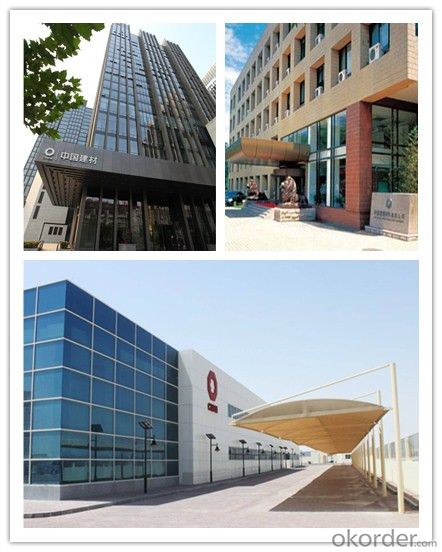
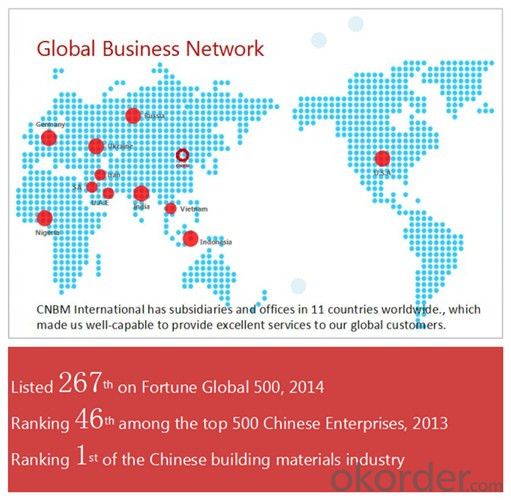
| After-sale service | CNBM provides the services and support you need for every step of our cooperation. We’re the business partners you can trust; you can relax and get on with doing business. |
| For any problem, please kindly contact us at any your convenient time, we’ll reply you in our first priority within 24 hours | |
| Advantages | Industry experience over 20 years. |
| Shipment of goods -More than 70 countries worldwide. | |
| The most convenient transport and prompt delivery. | |
| Competitive price with best service. | |
| High technical production line with top quality products. | |
| High reputation based on best quality products. |
Packaging & Delivery the Grade SAE 1008 Hot Rolled Steel Wire Rod in Coils
| Packaging Detail | Sea worthy packing /as per customer's packing instruction |
| Delivery Detail | 15 ~ 40 days after receiving the deposit |
Products Show
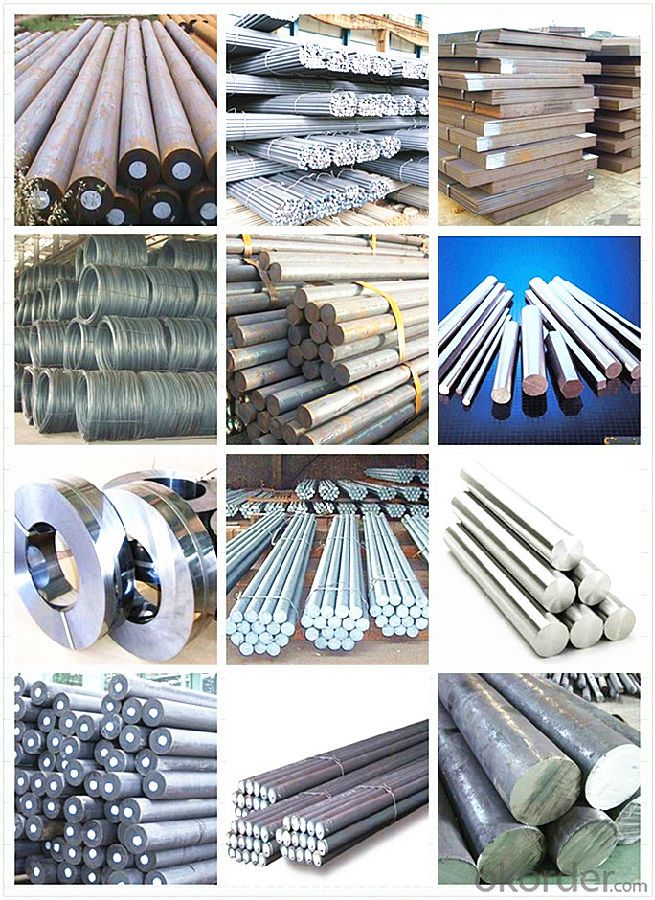
FAQ:
| Are you a trader or manufacturer? | Manufacturer |
| What’s the MOQ? | 3 metric ton |
| What’s your delivery time? | 15-35 days after downpayment received |
| Do you Accept OEM service? | Yes |
| what’s your delivery terms? | FOB/CFR/CIF |
| What's the Payment Terms? | 30% as deposit,70% before shipment by T/T |
| Western Union acceptable for small amount. | |
| L/C acceptable for large amount. | |
| Scrow ,Paybal,Alipay are also ok | |
| Why choose us? | Chose happens because of quality, then price, We can give you both. |
| Additionally, we can also offer professional products inquiry, products knowledge train (for agents), smooth goods delivery, excellent customer solution proposals. | |
| What's your available port of Shipment? | Main Port, China |
| What’s your featured services? | Our service formula: good quality+ good price+ good service=customer's trust |
| Where are your Market? | Covering more than 160 countries in the world |
- Q: How does stainless steel contribute to the automotive industry?
- Stainless steel contributes to the automotive industry by providing durability, corrosion resistance, and aesthetic appeal to various parts and components. It is commonly used in exhaust systems, engine components, body panels, and trim pieces, ensuring longevity and maintaining the integrity of vehicles even in harsh conditions.
- Q: What are the different special steel products available in the market?
- There are several different special steel products available in the market, including stainless steel, tool steel, alloy steel, high-speed steel, and carbon steel. Each type of special steel has unique properties and is used for various applications in industries such as construction, automotive, aerospace, and manufacturing.
- Q: How does special steel contribute to the textile industry?
- Special steel contributes to the textile industry by providing high-strength and durable components for textile machinery, such as looms, knitting machines, and textile processing equipment. The use of special steel in these machines ensures improved performance, precision, and longevity, thereby enhancing productivity and efficiency in textile manufacturing processes. Additionally, special steel's resistance to corrosion and wear helps maintain the quality and reliability of textile machinery, minimizing downtime and maintenance costs for manufacturers.
- Q: What are the different magnetic grades of special steel?
- The different magnetic grades of special steel include ferritic, martensitic, austenitic, and duplex stainless steels.
- Q: How does molybdenum improve the performance of special steel?
- Molybdenum plays a crucial role in enhancing the performance of special steel due to its unique properties and characteristics. First and foremost, molybdenum significantly improves the strength and toughness of steel, making it more durable and resistant to deformation. This is achieved by forming a solid solution with iron, which results in a fine-grained microstructure and reduces the formation of brittle phases in the steel. Moreover, molybdenum increases the hardenability of steel, allowing it to be heat-treated to obtain desired mechanical properties. This is particularly important in the production of special steel, where high strength, wear resistance, and thermal stability are often required. By enabling effective heat treatment, molybdenum ensures that the steel can be processed to meet specific performance requirements, such as hardness, toughness, and dimensional stability. Additionally, molybdenum enhances the corrosion resistance of special steel, making it suitable for various challenging environments. It forms a protective oxide layer on the surface of the steel, which acts as a barrier against corrosive substances like acids, alkalis, and salts. This resistance to corrosion is crucial in applications where the steel is exposed to harsh conditions, such as marine environments, chemical processing plants, and oil and gas industries. Furthermore, molybdenum improves the high-temperature strength and creep resistance of special steel. It enables the steel to maintain its mechanical properties even at elevated temperatures, making it suitable for applications where the steel is subject to prolonged exposure to heat or mechanical stress. In summary, molybdenum plays a vital role in enhancing the performance of special steel by improving its strength, toughness, hardenability, corrosion resistance, and high-temperature properties. These attributes make molybdenum an essential alloying element in the production of special steel for various industries, including automotive, aerospace, energy, and tool manufacturing.
- Q: What are the different corrosion-resistant coatings for special steel?
- Various corrosion-resistant coatings are available for special steel, each possessing unique properties and advantages. Some commonly used coatings include: 1. Zinc Coating: Galvanizing and other zinc coatings are widely employed to safeguard special steel against corrosion. The zinc layer acts as a sacrificial barrier, preventing corrosive elements from coming into contact with the steel. 2. Epoxy Coating: Due to their exceptional adhesion, chemical resistance, and durability, epoxy coatings are a popular choice for corrosion protection. They create a robust barrier that shields special steel from moisture, chemicals, and other corrosive agents. 3. Polyurethane Coating: In harsh environments where special steel is exposed to extreme conditions, such as offshore or marine applications, polyurethane coatings offer exceptional resistance against abrasion, chemicals, and weathering. 4. Ceramic Coating: Ceramic coatings provide outstanding corrosion protection and high-temperature resistance. They are frequently used in industries like aerospace and automotive, where special steel must withstand extreme temperatures and corrosive environments. 5. Metal Coating: Nickel or chromium coatings are frequently applied to special steel to enhance its corrosion resistance. These coatings establish a protective layer that acts as a physical barrier, preventing corrosion. 6. Powder Coating: Powder coatings are electrostatically applied and then cured under heat, resulting in a hard and durable protective layer. They offer excellent corrosion resistance and can be customized in terms of color and texture. Choosing the appropriate corrosion-resistant coating for special steel is crucial and should be based on specific requirements and the environment it will be exposed to. Factors such as temperature, exposure to chemicals or moisture, and desired coating lifespan should all be considered when selecting the suitable coating.
- Q: What are the common challenges in forging special steel?
- Common challenges in forging special steel include achieving the desired grain structure, maintaining uniformity and consistency throughout the material, controlling the temperature during the forging process, preventing cracks and defects, and ensuring proper heat treatment for the desired mechanical properties.
- Q: What are the different methods of surface laser cladding for special steel?
- Special steel can undergo surface laser cladding using various methods. Powder-based laser cladding is one such method, involving the injection of powder material into the laser beam. This material then melts and fuses with the special steel surface, offering desired properties like enhanced hardness or corrosion resistance. With this method, precise control over the cladding layer's thickness and composition is achievable. Wire-based laser cladding is another method. Here, a wire material is fed into the laser beam, which then melts and fuses with the special steel surface. Wire-based laser cladding is predominantly used for larger areas or when a thicker cladding layer is needed. It is also commonly employed to repair or salvage worn or damaged parts. A third technique is direct energy deposition (DED) laser cladding. This method utilizes a laser beam to melt a powder or wire material while depositing it onto the special steel surface. DED laser cladding facilitates the rapid buildup of multiple layers and is often utilized in additive manufacturing or for repairing high-value components. The choice of method for surface laser cladding depends on various factors, including the desired cladding thickness, material properties, and specific application requirements. Each method has its own advantages and limitations.
- Q: What are the different surface protection methods for special steel?
- There are several surface protection methods for special steel, including galvanization, coating with protective paints or varnishes, electroplating, and applying corrosion-resistant alloys or metals. These methods help prevent rust, corrosion, and other forms of damage, ensuring the longevity and durability of the special steel.
- Q: Can special steel be used in the printing industry?
- Yes, special steel can be used in the printing industry. Special steel, such as stainless steel or tool steel, can be utilized in the manufacturing of printing equipment and machinery parts. These types of steel provide excellent strength, durability, and resistance to wear and corrosion, making them suitable for various components used in printing presses, rollers, blades, and other machinery.
Send your message to us
Grade SAE 1008 Hot Rolled Steel Wire Rod in Coils
- Loading Port:
- Tianjin
- Payment Terms:
- TT OR LC
- Min Order Qty:
- 3 m.t.
- Supply Capability:
- 10000 m.t./month
OKorder Service Pledge
Quality Product, Order Online Tracking, Timely Delivery
OKorder Financial Service
Credit Rating, Credit Services, Credit Purchasing
Similar products
Hot products
Hot Searches
Related keywords
